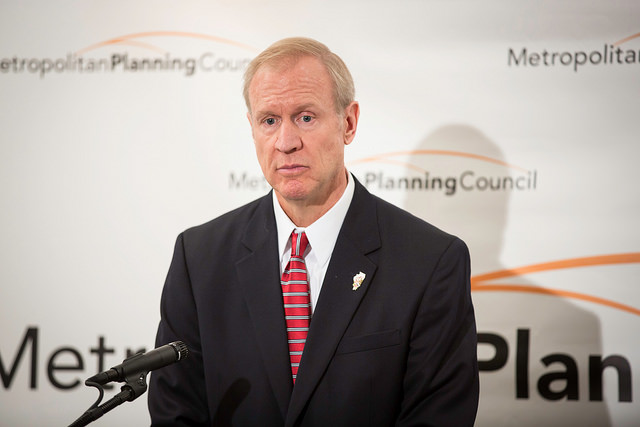Tension Rises At State Level Over Rauner's Budget Plan
By aaroncynic in News on Apr 21, 2015 2:05PM
Budget negotiations between Governor Bruce Rauner and state legislators are expected to heat up this week, as a special legislative committee created by House Speaker Michael Madigan will meet for the first time today. According to the Rockford Register Star, Madigan appointed the panel on Friday to take a look at what the governor has deemed “non-essential spending.” “In light of recent budget actions, and as we prepare to craft the next state budget, it's important to have an in-depth discussion about what the governor believes is non-essential,” said the speaker.
At the center of what will more than likely be a contentious fight over the budget are cuts Rauner has proposed to vital social services. The governor’s July 1 budget slashes funding for transportation, higher education and local governments. At the beginning of the month, he tacked on an additional $26 million in cuts which affect programs for people with disabilities, HIV and AIDS and burials for the poor. The governor also plans to hammer and shake all over working people by creating “right to work” zones, drastically changing the pension system and further restricting unemployment benefits.
Meanwhile, Rauner will launch a press blitz via a new multimillion dollar campaign dubbed “Illinois Turnaround.” Much like the way Chicago Forward supported Rahm Emanuel’s allies in the mayoral election, Illinois Turnaround will support Rauner’s allies in the state legislature. Rich Miller at Capitol Fax writes the independent expenditure committee, which has no caps on contributions to or from it, says it will “support state legislative candidates who support Gov. Rauner’s bold and needed reforms, and to oppose those who stand in the way.”
In other words, prepare for a lot of advertising where someone sporting a cheap watch and Carhartt jacket tries to sell viewers the idea that $100 million tax breaks to corporations coupled with draconian cuts that will only affect poor people with no new revenue options will somehow save the middle class.
Rauner’s camp also released a poll filled with answers to specifically designed loaded questions that attempt to paint a rosy portrait over what is essentially, well, a lump of shit. While his job approval rating is 38 percent, 57 percent of people agree that “Bruce Rauner is trying to shake things up in Springfield, but the career politicians are standing in his way.” 56 percent of people said they were less likely to “vote for a State Representative who voted to raise the Illinois income tax rate without any property tax freeze and without any significant economic or budget reforms to help our economy grow.”
A Rauner insider told Miller “Every time they (Democrats) attack us, they are reinforcing that they are insiders and the governor is the outsider - he’s the one trying to change things.”
This is because Rauner, thanks to nearly unlimited campaign coffers and penchant for parking his “Shake Up Express” outside Super 8 motels, managed to pull off the image of a “workin’ man,” while having an opposite agenda. Rauner was bankrolled by extraordinarily wealthy private investors, equity firms and real estate moguls, and things like “right to work” zones line the pockets of big business rather than help working class people.
And while Illinois democratic politicians do share plenty of the blame for the state’s sorry budget condition, particularly the backlog of unpaid bills, one can’t simply say Rauner’s cuts are “consequences” and move on. His allies helped stamp out the chance for a progressive tax in Illinois, though it polled favorably at 87 percent, while he let the temporary income tax hike roll back, creating an even larger budget hole. He and his pals also don’t like the idea of Madigan’s “millionaire’s tax,” which could generate $1 billion in revenue and polls between 63 and 75 percent favorable.
Rauner’s austerity agenda is one that’s all too common among politicians that try to sell this certain idea to people. He can manage to shake up millions to spin them, but somehow can’t come up with the money to actually fund the programs being cut. Meanwhile, everyone but the rich will begrudgingly have to make more “shared sacrifices.”
